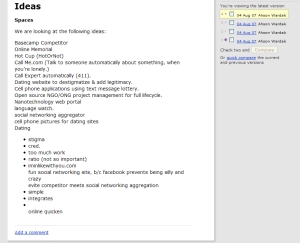Book Yourself Solid by Michael Port is a book about becoming a independent contractor. The book lays out strategies for developing business and consulting gigs. From the beginning, the book is more about marketing and selling ones services. It’s a book that you might need to do one or 2 consulting gigs to boostrap your business. not the ideal solution ever but you never know so it’s good to have some knowledge on the field.
The high points of this book include:
Imagine your ideal user/client You have to imagine and characterize your ideal client, much the same way that we have to imagine ShareMeme’s ideal user. When you stray away from seeking out your ideal client, you have a tendency to stress yourself out and not get the most of your independent contracting or service for your client.
Don’t sell everything on the first try. The typical sales cycle should move gradually up from free, less priced services to higher priced services. At some point, the website should give away something for free even without registering. Lower the barrier to entry even more to your website.
Network. The book recommends that when you get someone’s information, that you use it to keep in touch. Even if you never talk to that person again, it’s helpful to have their information. Later on, they can be added to a newsletter or something.
Practice pitching. The basic framework proposed by Port is: 1) explain the target market, 2) explain their primary problem, 3) explain what you do, 4) explain a dramatic result from a previous client, and 5) explain the benefits. This pitch can be pared down to shorter versions for different discussions.


